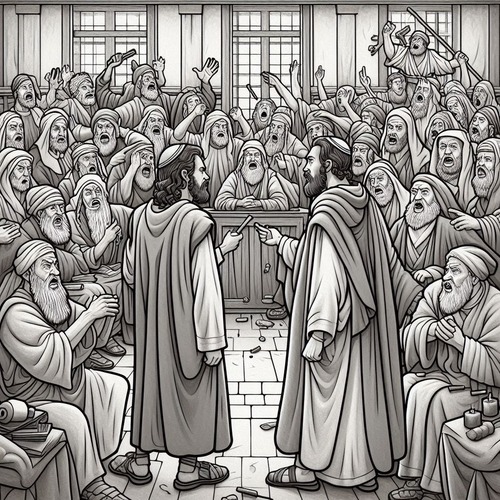Spiritual Warfare: A Believer’s Guide to Complete Battle Armour
This exploration of spiritual warfare is grounded in Paul’s teaching in Ephesians 6:10-18. Writing to believers in Ephesus—a city steeped in occult practices and pagan worship—Paul unveils both the reality of our spiritual conflict and God’s provision for victory through the complete armour He provides His people.
Imagine waking each morning to the distant thunder of artillery and the wail of air raid sirens. Our city is a battleground, and every trip to get groceries requires tactical planning, every journey to work demands vigilance. Then one morning, the news crackles over the radio: the enemy’s high command has surrendered unconditionally. The war is technically over—our side has won. Yet outside our window, local enemy units continue fighting, either unaware of, or refusing to accept, their command’s surrender. Tanks still roll through streets, snipers still hide in bombed-out buildings, and danger still lurks around every corner.
This is precisely our position in the cosmic war between God’s kingdom and the forces of darkness. At Calvary, Christ delivered the decisive blow—the ultimate victory is secured. Satan’s power has been broken, his defeat is certain. Yet like those scattered enemy units, dark forces continue their desperate resistance, launching attacks against God’s people. We face real battles, genuine threats, and must maintain constant vigil. But here’s the crucial difference: we fight not wondering if we’ll win, but from the unshakeable knowledge that Christ has already won. Our task isn’t to achieve victory but to implement and enforce the victory Christ has already secured…
THE DAILY REALITY OF EVIL AND OUR EVERPRESENT HELP
The reality of spiritual warfare (Ephesians 6:12) isn’t merely metaphorical—it represents the fundamental conflict between God’s kingdom and the forces of darkness. And we’re caught in the thick of this battle, every moment of our lives. The conflict began in Eden and will continue, without respite, until Christ’s return.
The conflict helps us see first our total depravity—that in our natural state, apart from Christ, we’re completely unable to resist evil in our own strength. Yet, as believers we also begin to see God’s common grace. This grace actively restrains evil in the world, preventing its full expression and providing a framework for human society to function. What’s more, God equips His children, making them battle-ready daily.
We live in the tension of the “already but not yet”—Christ has won the decisive victory at the cross, yet the final consummation awaits His return. This means our spiritual warfare isn’t fought for victory. Instead, it’s fought from the position of Christ’s victory. Understanding this distinction transforms how we approach spiritual battle.
LIVING IN THE POWER OF GOD
Our union with Christ forms the absolute foundation for spiritual warfare. This union isn’t merely a theological concept but a living reality—we’re truly joined to Christ, sharing in His death and resurrection, and drawing our spiritual life and strength directly from Him.
The Holy Spirit’s work in sanctification drives our spiritual warfare. The Spirit doesn’t merely give us power for battle; He transforms our nature, renewing our minds and affections while strengthening our will to resist evil.
Our trust in the Father’s sovereignty: Providence plays a crucial role in spiritual battles, as God sovereignly orchestrates circumstances for our spiritual growth and victory. Each challenge we face comes through His wise governing of all things, and is designed to strengthen our faith and demonstrate His faithfulness.
THE BELT OF TRUTH (Ephesians 6:14)
Every believer knows that restless feeling of going into the day without having first been grounded in God’s truth—it’s like entering a battlefield with our trousers hanging loose. Just as a Roman soldier would never consider going into battle without first securing his belt—which held his inner tunic in place—we’re to begin each day by fastening the belt of truth around us through Scripture reading and prayer. The rest of the armour will do the soldier no good, if his inner garments hang loose and hinder his movements. The belt isn’t optional equipment or a mere supplement to our spiritual life; it’s the foundational piece that makes all other aspects of spiritual warfare possible.
So it’s not without reason that the belt of truth is the first detail we’re to secure in our armour. It encompasses the whole counsel of God’s revealed Word, systematically unfolding His character, promises, and purposes. When we neglect this essential routine—whether through rushed devotions or skipped Bible reading—we spend our days feeling spiritually ill-equipped. The belt serves dual purposes: it represents both the objective truth of God’s revealed Word and our personal, wholehearted embrace of that truth. Without it firmly in place, we lack the discernment to recognise error, the stability to stand firm in sound doctrine, or the confidence to engage in spiritual warfare.
THE BREASTPLATE OF RIGHTEOUSNESS (Ephesians 6:14)
The breastplate of righteousness is secured through daily meditation on the glorious truth of our justification—that perfect righteousness of Christ now credited to our account. In the Reformed tradition, this involves specific spiritual disciplines: regular self-examination in light of Scripture, confession of sin, renewal of our grasp on Christ’s finished work, and grateful meditation on our adoption in Christ. As we practice these disciplines, we find our hearts increasingly protected against Satan’s accusations and our own tendency toward both pride and despair.
The joy that flows from this position of security in Christ becomes itself a source of strength in our sanctification. As the Puritans often noted, there is an unbreakable connection between the joy of justification and the power for holy living—the more we delight in Christ’s righteousness credited to us, the more we desire to live righteously. Even in our fiercest trials, when Satan’s attacks are most intense, this breastplate provides dual protection: we rest in Christ’s perfect righteousness imputed to us while simultaneously finding strength to pursue practical righteousness. The result is a profound peace that remains steady even when our feelings fluctuate.
THE SHIELD OF FAITH (Ephesians 6:16)
Faith comes to us as a pure gift of God’s grace, not generated by human will or effort but sovereignly bestowed by the Holy Spirit. This saving faith is more than mere intellectual assent—it involves a complete trust in and reliance upon Christ, uniting us to Him in all His benefits. While faith serves as the instrument of our justification, receiving Christ’s righteousness, it also functions as an active shield in spiritual warfare, extinguishing Satan’s fiery darts of doubt, temptation, and accusation. The doctrine of the perseverance of saints assures us this shield cannot ultimately fail, for God Himself maintains our faith even when we feel weak. The Puritans, particularly John Bunyan in “The Holy War,” vividly illustrated how faith operates both defensively and offensively in spiritual battle, teaching us to actively exercise our God-given faith. (READ OUR POST: )
THE HELMET OF SALVATION (Ephesians 6:17)
The helmet of salvation rests securely on the unshakeable foundation of God’s eternal decree of election, protecting our minds from doubt and despair. This protective gear includes the gift of assurance, which grows stronger as we see evidence of God’s saving work in our lives through the Spirit’s witness and our growing sanctification.
The doctrine of perseverance teaches us this helmet cannot be dislodged—our assurance of salvation is as secure as God’s unchangeable purpose. This certainty generates an unshakeable hope that sustains us through the fiercest spiritual battles. Our salvation is grounded in God’s faithful promises, not our performance.
THE SWORD OF THE SPIRIT (Ephesians 6:17)
While Scripture is our supreme weapon in spiritual warfare—divinely inspired, infallible, and authoritative—its power lies not merely in our memorisation or knowledge of it, but in the Spirit’s active work of illuminating and applying it. Just as Jesus promised His disciples the Spirit would give them words to speak when accused (Matthew 10:19-20), we too can trust the Spirit to bring specific Scripture to mind at crucial moments in our spiritual battles. This dynamic partnership between the written Word and the Spirit’s illumination makes this sword uniquely powerful.
The sufficiency of Scripture means we need no additional revelation or weapon beyond what the Spirit has already provided in His Word. Yet this sufficiency is not static—it’s dynamic through the Spirit’s ongoing work of teaching, reminding, and applying Scripture to our specific situations. As we engage in meditation and systematic study of the Bible, internalising God’s Word until it becomes part of our spiritual muscle memory, the Spirit makes these truths alive and active in our daily battles.
THE GOSPEL SHOES (Ephesians 6:15)
The peace established by Christ through His work on the cross provides us a firm footing in spiritual warfare. These shoes enable us to stand immovable on God’s covenant promises, knowing our position in Christ is secure. They also equip us for the advance of the gospel, making us ready to share the good news of peace with God through Christ.
The profound relationship between peace and warfare in Scripture shows us true peace with God actually intensifies our spiritual conflict with darkness, even as it assures us of ultimate victory.
CONCLUSION
The battle we face is real, but our victory is secure in Christ. As we daily don the full armour of God—from the foundational belt of truth to the mighty Sword of the Spirit—we fight not for victory but from victory. In this cosmic conflict, we stand not as isolated warriors but as part of Christ’s army, the Church, equipped with His armour, empowered by His Spirit, and sustained by His means of grace. While the enemy’s local resistance continues until Christ’s return, we advance with confidence, knowing the decisive battle was won at Calvary and final victory is certain.
SPIRITUAL WARFARE—RELATED FAQS
How do the means of grace strengthen us in spiritual warfare? The means of grace—Word, sacraments, and prayer—are God’s ordained channels for strengthening His people in battle. In the Lord’s Supper, we feed on Christ by faith, receiving spiritual nourishment for the fight, while in baptism we’re reminded of our union with Christ in His death and resurrection. Corporate prayer and worship aren’t optional extras but essential provisions for warfare, building up our spiritual resilience.
What role do spiritual gifts play in spiritual warfare? Spiritual gifts are divine empowerments for building up the body of Christ, making the whole church more effective in spiritual warfare. While Reformed theology emphasizes the primacy of ordinary means of grace, it acknowledges that spiritual gifts—whether teaching, discernment, faith, or others—equip the church for battle. These gifts operate under Scripture’s authority and within the church’s oversight.
Why is church membership and fellowship crucial for spiritual warfare? Just as Roman soldiers fought in formations, Christians are called to fight spiritual battles within the covenant community. The church provides accountability, encouragement, corporate prayer, and the exercise of spiritual gifts that strengthen us for battle. Isolation makes us vulnerable to enemy attack, while proper submission to church authority provides protection.
How do we distinguish between spiritual attack and ordinary trials? While not every difficulty is a direct spiritual attack, Reformed theology teaches us to see all trials within God’s sovereign purposes. The key is discerning patterns of spiritual opposition, particularly those targeting our faith, hope, and love. Regular consultation with mature believers and church leadership helps in this discernment.
What role does corporate worship play in spiritual warfare? Corporate worship isn’t just a weekly ritual but a divine encounter where God’s people are equipped and strengthened for battle. Through the preached Word, sacraments, corporate prayer, and congregational singing, we receive fresh supplies of grace for warfare. The gathered church presents a unified front against spiritual opposition.
How do we help fellow believers under spiritual attack? We support embattled believers through intercessory prayer, Scripture-based encouragement, and practical assistance. The Reformed tradition emphasises both the corporate nature of spiritual warfare and the importance of bringing specific Scriptures, historical examples of God’s faithfulness, and covenant promises to bear in supporting struggling saints.
How should we understand prayer and watchfulness in spiritual warfare? Prayer in spiritual warfare isn’t just asking for help—it’s active communion with our Commander-in-Chief, receiving battle instructions and divine intelligence about the enemy’s schemes. The Reformed tradition emphasises “watching unto prayer,” combining vigilant awareness of spiritual realities with constant prayer, both personal and corporate. This includes set times of prayer, spontaneous prayer throughout the day, and maintaining a watchful spirit that stays alert to both danger and divine opportunities.
SPIRITUAL WARFARE—OUR RELATED POSTS
Editor's Pick

Paul’s Mandate for Men: Headship Or Servant Leadership? Or Both?
Modern Christianity has fallen into a trap. We've created an either/or battle between "headship" and "servant leadership," as if these [...]

Should We Stop Using Male Pronouns for God? Why Do We Say No?
A friend of ours arrived eagerly at his first theology class in seminary. But he quickly discovered something troubling: the [...]

Did Old Testament Law Force Women to Marry their Rapists?
**Editor’s Note: This post is part of our series, ‘Satan’s Lies: Common Deceptions in the Church Today’… Viral misinformation abounds [...]

From Danvers To Nashville: Two Statements, One Biblical Vision
30 years separate the Danvers Statement on Biblical Manhood and Womanhood (1987) and the Nashville Statement on Human Sexuality (2017). [...]

The Nashville Statement: Why Affirm It Despite Media Backlash?
WHY DO REFORMED CHRISTIANS STAND BY THIS STATEMENT ON MARRIAGE AND GENDER? When the Nashville Statement was released in 2017, [...]

Who Is Belial? Solving The 2 Corinthians 6:15 Mystery
Belial: This name from the pages of Scripture chills the soul. Who is this mysterious figure Paul invokes in 2 [...]

Celibacy Or Castration: What Jesus Really Means in Matthew 19:12
One of Scripture's most shocking misinterpretations led theologian Origen to castrate himself in the third century. His tragic mistake? Taking [...]

Philippians 4:13: Did Paul Really Mean We Can Do ALL Things?
"I can do all things through Christ who strengthens me." It's on gym walls, graduation cards, and motivational posters everywhere. [...]

The Ordinary Means of Grace: Why Are They Indispensable?
ORDINARY MEANS FOR EXTRAORDINARY TRANSFORMATION What if God's most powerful work in believers' lives happens through the most ordinary activities? [...]

Is the Bible God’s Word? Or Does It Only Contain God’s Word?
The authority of Scripture stands at the crossroads of modern Christianity. While some argue the Bible merely contains God’s Word [...]
SUPPORT US:
Feel the Holy Spirit's gentle nudge to partner with us?
Donate Online:
Account Name: TRUTHS TO DIE FOR FOUNDATION
Account Number: 10243565459
Bank IFSC: IDFB0043391
Bank Name: IDFC FIRST BANK






